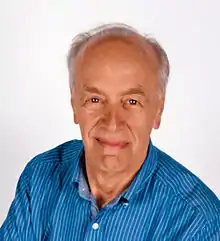
Anthony "Tony" I. Wasserman, is an American computer scientist. He is a member of the board of directors of the Open Source Initiative,[1] was a professor of the Practice in Software Management at Carnegie Mellon Silicon Valley, and is executive director of the CMU Center for Open Source Investigation.[2] He has been a SkyDeck accelerator program advisor at University of California, Berkeley since 2021.[3]
As a faculty member at Carnegie Mellon University's Silicon Valley campus, Wasserman taught classes in software product definition, software product strategy, and open source software. He is a frequent speaker at Open Source conferences around the world including the Open World Forum.[4] He was the general chair of the tenth international conference on Open Source systems, OSS2014, in Costa Rica.[5]
After serving as a Professor of Medical Information Science at the University of California, San Francisco and as a Lecturer in the Computer Science Division at the University of California, Berkeley, Wasserman founded and was CEO of Interactive Development Environments (IDE), a computer-aided software engineering company that was one of the first 100 dotcoms (no. 78), from 1983-1993 (7), and as Chair from 1983-1996. He then became vice president of Bluestone Software before its acquisition by Hewlett Packard, leading the development of early mobile applications.[2]
In 1996 he was elected as a fellow of the IEEE "for contributions to software engineering, including the development of computer-aided software engineering (CASE) tools".[6] In the same year he also was selected as a Fellow of the Association for Computing Machinery "for technical and professional contributions to the field of software engineering".[7]
Academic research
Wasserman's academic research focused on two projects: the User Software Engineering (USE) project, begun at the University of California, San Francisco, in 1975[8] and the Center for Open Source Investigation (COSI), begun at Carnegie Mellon University, Silicon Valley, in 2005. The focus of the User Software Engineering project was "user-centered design, combined with techniques for software engineering, in order to produce systems that are reliable, easy to use, and well adapted to user needs."[9][10] The focus of the COSI work is evaluation and adoption of open source software by businesses and organizations, originally the Business Readiness Rating,[11] now OSSpal.[12] Wasserman earned his A.B. degree at the University of California, Berkeley, in 1966 with a double major in Mathematics and Physics, and earned his Ph.D. in Computer Sciences from the University of Wisconsin - Madison in 1970.[13]
References
- ↑ Open Source Initiative Board of Directors, accessed 2014-01-02.
- 1 2 CMU Silicon Valley faculty profile, accessed 2014-01-02.
- ↑ "Advisors – Berkeley SKYDECK".
- ↑ "Bio for Tony Wasserman". Open World Forum. Retrieved 15 September 2015.
- ↑ "OSS2014 Organization Committee". OSS2014. Retrieved 5 May 2014.
- ↑ IEEE Fellows directory, accessed 2014-01-02.
- ↑ ACM Fellow award citation, retrieved 2014-01-02.
- ↑ Wasserman, Anthony Ira. "Some Principles of User Software Engineering for Information Systems." IEEE COMPCON Spring 75 Conference Digest. 1975.
- ↑ Wasserman, A.I., “User Software Engineering and the Design of Interactive Systems,” Proc. 5th Int’l. Conf. on Software Engineering, San Diego, 1981, pp. 387-393.
- ↑ A. I. Wasserman and D. T. Shewmake "Rapid prototyping of interactive information systems", ACM Software Eng. Notes, vol. 7, no. 5, pp.171 -180 1982
- ↑ Wasserman, Anthony I., Murugan Pal, and Christopher Chan. "The Business Readiness Rating: a framework for evaluating open source." EFOSS-Evaluation Framework for Open Source Software (2006)
- ↑ A.I. Wasserman, "OSSpal: Finding and Evaluating Open Source Software," in Open Source Systems: Toward Robust Practices, ed. F. Balaguer et al., Springer Verlag, 2017, pp.193-203. (Proceedings OSS 2017)
- ↑ A. Wassermann: Achievement of Skill and Generality in an Artificial Intelligence Program. Dissertation. University of Wisconsin-Madison, 1970.